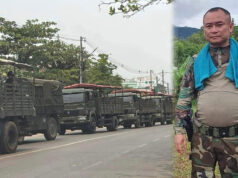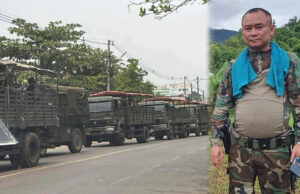Feature written by KIC reporters
April 30
Burmese migrant workers denied May Day holiday
Labor Day, May 1, is an annual holiday celebrated all over the world by workers and their national unions to mark the economic and social achievements of their struggles. Workers from Albania to Zimbabwe will take to their respective streets to remember the hard fought battles for their rights.
But not all workers are equal.
While Labor Day is a national holiday in Thailand, most Burmese migrant workers will not be allowed time off work to celebrate.
In Thailand, only some Burmese factory workers will be given the holiday. Agricultural, domestic and construction workers will have to turn up for work.
Saw Hla, a construction worker in Tak province, works from eight in the morning to five in the evening, with a one-hour lunch break. He says the May Day celebrations will make no difference to his daily schedule.
“I have to work every day, Labor Day or not. I work seven days a week for 3,000 baht a month. Before I started, I was promised 3,500 baht, but the boss changed that after I started work.”
Saw Hla says he does not like the heavy work.
“The work is hard. It’s heavy, carrying cement, sand, rocks, bricks and concrete tanks. The boss always shouts at us. He treats us badly. I don’t have options. If I did I would leave,” he said.
There are 280 factories in the Mae Sot border district according to officials. But, labor activist, Moe Joe, chairperson, for the Joint Action Committee for Burma Affairs, estimates there are as many as 1,000 factories- both big and small.
“Some are small operations with no proper sanitation and safety controls. And, some are big and employ as many as 4,000 workers. All have problems. If workers are sick and if they need time off they are given only a few hours. Many employers prefer single workers to those who have small children. Many newly married couples fear getting sacked if a pregnancy occurs. Some risk backyard abortions to keep their job. ”
Human rights groups and labor organizations estimate as many as three million migrant workers from Laos, Cambodia and Burma have made the tough decision to make the arduous trek from their homeland into Thailand. About 80 percent of these are Burmese.
Human Rights Watch said in a press release to launch their recent report, ‘From the tiger to the crocodile: Abuse of migrant workers in Thailand’, Burmese employees are subjected to “…severe human rights abuses faced by migrant workers in Thailand, including killings, torture in detention, extortion, and sexual abuse, and labor rights abuses such as trafficking, forced labor, and restrictions on organizing.”
Maung Than Soe, 27, has worked 10 years in the same clothing factory in Mae Sot making shirts and doesn’t know if he will get a May Day holiday.

“We don’t have organized holidays we work to job orders as directed by the boss. If we break during orders our wages are cut.”
Maung Than Soe earns about 70 baht a day. On a good day, if he works hard, he says he can get about 90 baht.
“Under Thai law we are supposed to get an extra 27 baht for overtime, but our boss only pays us five baht. We could work up to three extra hours and get only five baht. We’re paid by the piece.”
Brad Adams, Asia director at Human Rights Watch said in the press release that the value of migrant workers to Thailand is overlooked.
“Migrant workers make huge contributions to Thailand’s economy, but receive little protection from abuse and exploitation. Those from Burma, Cambodia, and Laos suffer horribly at the hands of corrupt civil servants and police, unscrupulous employers, and violent thugs, who all realize they can abuse migrants with little fear of consequences.”
Maung Than Soe says it is hard to send money back to his family in Burma.
“From my salary, I can only manage to send back 50,000kyat (about 1700 baht) to them in a year. It might not be much, but it’s more than many of my friends send.”
Labor activist, Moe Joe, from JACBA, says not all factory workers will get the May Day holiday and no workers from the rural, construction or domestic worker sectors will get it.
“In the past when we worked alone, we had little success bringing abuse cases against the employers, but now that we have links with Thai labor lawyers we are having more success in disputes with the bosses.”
In spite of being denied their May Day holiday, many Burmese workers and workplace activists will celebrate by going to their temples in the morning and by celebrating with friends in the evening.
The Yaung Chii Oo Association, a labor rights organization, which advocates and works on behalf of migrant workers, planned to hold a ceremony with the singing of traditional Burmese ‘Than Chat’ songs of defiance to celebrate May Day. An YCOA spokesman said they invited all workers to come and celebrate.
“We think the bosses will not want their workers coming to celebrate, they might find out about their rights and demand better wages and conditions.”

















